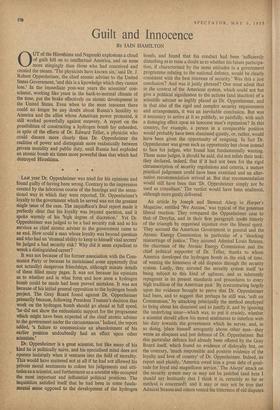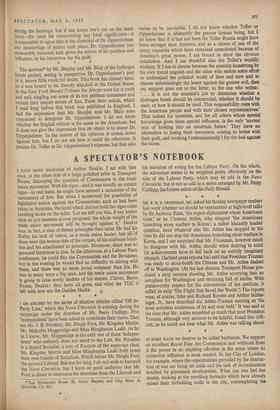Guilt and Innocence
BY IAIN HAMILTON OUT of the Hiroshima and Nagasaki explosions a cloud of guilt fell on to intellectual America, and on none more stingingly than those who had conceived and created the means. 'The physicists have known sin,' said Dr. J. Robert Oppenheimer, the chief atomic adviser to the United States Government, 'and this is a knowledge which they cannot lose.' In the immediate post-war years the scientists' con- science, working like yeast in the back-to-normal climate of the time, put the brake effectively on atomic development in the United States. Even when to the most innocent there could no longer be any doubt about Russia's hostility to America and the allies whom American power protected, it still worked powerfully against recovery. A report on the possibilities of constructing a hydrogen bomb lay unheeded, in spite of the efforts of Dr. Edward Teller, a physicist who could discern more clearly than Dr. Oppenheimer the realities of power and distinguish more realistically between private morality and public duty, until Russia had exploded an atomic bomb six times more powerful than that which had destroyed Hiroshima.
Last year Dr. Oppenheimer was tried for his opinions and found guilty of having been wrong. Contrary to the impression created by the laborious course of the hearings and the sensa- tional way in which they were reported, Dr. Oppenheimer's loyalty to the government which he served was not the greatest single issue of the case. The inquistlion's final report made it perfectly clear that his loyalty was beyond question, and it spoke warmly of his 'high degree of discretion.' Yet Dr. Oppenheimer was judged to be a bad security risk and so his services as chief atomic adviser to the government came to an end. How could a man whose loyalty was beyond question and who had an 'unusual ability to keep to himself vital secrets' be judged a bad security risk? Why did it seem expedient to wreck a distinguished career?
It was not because of his former association with the Com- munist Party or because he maintained some apparently (but not actually) dangerous friendships, although minute details of these filled many pages. It was not because his opinions as to whether and in what form and how soon a hydrogen bomb could be made had been proved mistaken. It was not because of his initial general opposition to the hydrogen bomb project. The Gray Board found against Dr. Oppenheimer primarily because, following President Truman's decision that work on the hydrogen bomb should go ahead at full speed, `he did not show the enthusiastic support for the programme which might have been expected of the chief atomic adviser to the government under the circumstances.' Indeed, the report added, 'a failure to communicate an abandonment of his earlier position undoubtedly had an effect upon other scientists.'
Dr. Oppenheimer is a great scientist, but like many of his kind he is politically naive, and his specialised mind does not operate incisively when it ventures into the field of morality. This would have mattered not at all if he had not allowed his private moral sentiments to colour his judgements and atti- bomb, and found that his conduct had been 'sufficiently disturbing as to raise a doubt as to whether his future participa- tion, if characterised by the same attitudes in a government programme relating to the national defence, would be clearly consistent with the best interests of security.' Was this a just conclusion? And was it justly phrased? One must admit that in the context of the American system, which could not but give a political significance to the actions (and inaction) of a scientific adviser so highly placed as Dr. Oppenheimer, and in that also of the rigid and complex security requirements and arrangements, it was an inevitable conclusion. But was it necessary to arrive at it so publicly, so painfully, with such a damaging effect upon an innocent man's reputation? In this country, for example, a person in a comparable position would probably have been dismissed quietly, or, rather, would have been given the opportunity of resigning. In fact Dr. Oppenheimer was given such an opportunity but chose instead to face his judges, who found him fundamentally wanting. Those same judges, it should be said, did not relish their task: they declared, indeed, that if it had not been for the rigid circumscription of security regulations and criteria, a mature practical judgement could have been exercised and an alter- native recommendation arrived at. But that recommendation would still have been that `Dr. Oppenheimer simply not be used as consultant.' The verdict would have been unaltered, although more gently delivered.
An article by Joseph and Stewart Alsop in Harper's Magazine, entitled 'We Accuse,' was typical of the generous liberal reaction. They compared the Oppenheimer case to that of Dreyfus, and in their first paragraph spoke bitterly of the triumph by organised injustice over the liberal spirit. They accused the American Government in general and the Atomic Energy Commission in particular of a 'shocking miscarriage of justice.' They accused Admiral Louis Strauss, the chairman of the Atomic Energy Commission and the chief political supporter of Dr. Teller, thanks to whom America developed the hydrogen bomb in. the nick of time. of venting the bitterness of old disputes through the security system. Lastly, they accused the security system itself 'as being subject to this kind of ugliness, and as inherently repugnant in its present standards and procedures to every high tradition of the American past.' By, concentrating largely upon the evidence brought to prove that Dr. Oppenheimer had been, and to suggest that perhaps he still was, 'soft on Communism,' by attacking principally the method employed to bring about his dismissal and to justify it, and by ignoring the underlying issue—which was, to put it crudely, whether a scientist should allow his moral sentiments to interfere with his duty towards the government which he serves, and, in so doing, place himself arrogantly above other men—they wrote an eloquent and just defence of Dr. Oppenheimer. But this particular defence had already been offered by the Gray Board itself, which found no evidence of disloyalty but, on the contrary, 'much responsible and positive evidence of the loyalty and love of country' of Dr. Oppenheimer. Indeed, its report said plainly, 'America owed him a great debt of grati- tude for loyal and magnificent service.' The Alsops' attack on the security system may or may not be justified (and here I should say hesitantly that I think it is, certainly so far as method is concerned); and it may or may not be true that Admiral Strauss and others vented the bitterness of old disputes during the hearings; but if one keeps one's eye on the main issue—the issue far transcending any local significance—it is impossible to agree that in the dismissal of Dr. Oppenheimer any miscarriage of justice took place. Dr. Oppenheimer was undeniably innocent, and, given the nature of his position and influence, in his innocence lay his guilt. * * The account* by Mr. Shepley and Mr. Blair of the hydrogen bomb project, setting in perspective Dr. Oppenheimer's part in it, leaves little room for doubt. This book has already been, as it was bound to be, fiercely attacked in the United States. In the New York Herald Tribune the Alsops went for it tooth and nail, singling out some of its too partisan comments and certain (not major) errors of fact. From their article, which I read long before this book was published in England, I had the impression that Mr. Shepley and Mr. Blair were concerned to denigrate Dr. Oppenheimer. I do not know whether the English edition is the same as the American, but it does not give the impression that its object is to smear Dr. Oppenheimer. In the matter of his opinions it comes down against him, butt do not see how it could do otherwise. It praises Dr. Teller at Dr. Oppenheimer's expense, but that also seems to be inevitable. I dO not know whether Teller or Oppenheimer is ultimately the greater human being, but I do know that if it had not been for Teller Russia might have been stronger than America, and as a citizen of one of the many countries which have remained unmolested because of America's great power, I am bound to draw the obvious conclusion. And I am thankful also for Teller's worldly wisdom. If I am to choose between the scientist hamstrung by his own moral anguish and the other who makes some effort to understand the political world of hero and now and to choose unhesitatingly the lesser against the greater evil, then my support goes out to the latter, to the one who writes: `. . . it is not the scientist's job to determine whether a hydrogen bomb should be constructed, whether it should be used, or how it should be used. This responsibility rests with the American people and with their chosen representatives.' That indeed for scientists, and for all others whose special knowledge gives them special influence, is the only 'modest way of looking into an uncertain future.' They have no alternative to losing their innocence, coming to terms with their guilt, and working (`enthusiastically') for the bad against the worse.











































 Previous page
Previous page